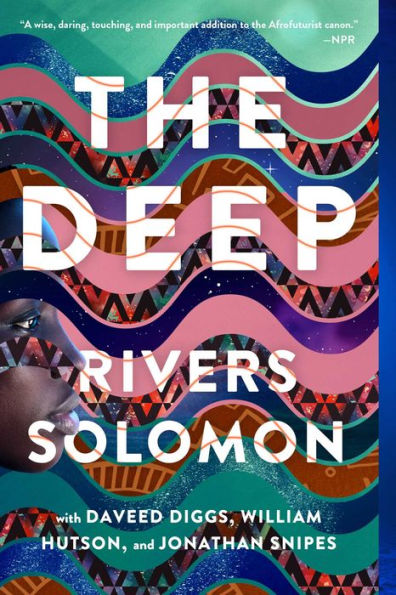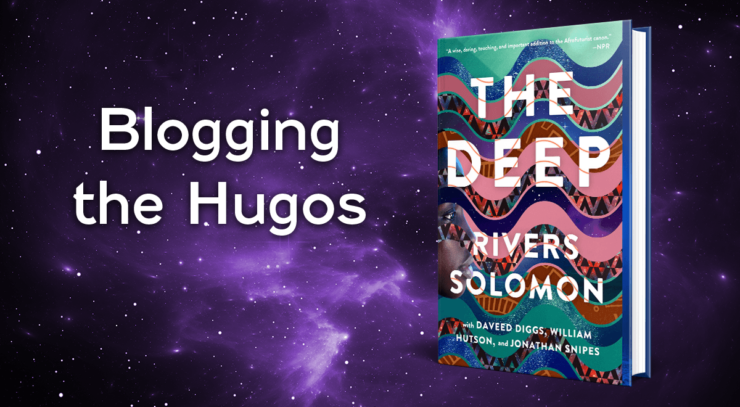In the lead-up to the 2020 Hugo Awards, we’re taking time to appreciate this year’s best novella Finalists, and what makes each of them great.
This is a story about pain and burden. This is a story about love, family, community. This is a story about carrying all of those things inside you, all at once, and feeling all of it intensely.
Rivers Solomon’s The Deep, a novella written after a song of the same name by clipping, centers around Yetu—a historian of the wajinru, water-dwelling creatures with scales and fins but human-like faces. Yetu’s position as historian is sacred, but a burden for her. It is her task to hold all the memories of her people inside her, forced to re-live both pain and joy seemingly against her will, while the others are free to live impulsive, easy-going lives.
When it comes time for her to pass on the memories to her people as part of their yearly Remembrance ceremony, to unburden herself for a quick period of time so that others’ lives may be given context, she seizes an opportunity. While others hold the memories she has given to them, she bolts, running off in search of a life of her own.
Buy the Book


The Deep
As readers, we learn that the wajinru are descendants of children born from enslaved mothers thrown overboard during the passage from Africa. We know it’s a horrific history that Yetu carries, all on her own. The images presented to us are both beautiful and sickening—there is something lovely about the idea that a home was found and community was formed. There’s something lovely in thinking about beautiful Black-skinned creatures that survived, and that something magic happened in the sea. But we know that magic was borne of atrocity. We know that, in our world, it is not so beautiful. We know that history is dark, violent, devastating, and that there is no escape.
After all, wasn’t cavity just another word for vessel? Her own self had been scooped out when she was a child to make room for ancestors, leaving her empty and wandering and ravenous.
Yetu’s life is heavy. Her sensitivity to the electric pulses that her people use to communicate means that she feels things much more deeply than others, even the historians that have come before her. She feels everything so much, and when the Remembrances overtake her, it’s a painful experience. In the opening chapter, she is struggling so much, she has let herself drift out in the hopes that sharks might find her—both so that she might feel something real in her body again, and so that the feeling might end all together. She wants so badly for it to end, to be free of the ache of feeling too much and trying to feel nothing at all and no one else understands, how could they, when she is so alone.
I don’t want to trivialize the emotions here. Yetu’s state of mind will feel familiar to anyone who has struggled with depression or suicidal ideation. But it’s so specifically about the weight of the Black experience and the history of anti-Black racism that it doesn’t seem possible for anyone living outside of that experience to really understand. It’s incredibly dark. Yetu’s story is about wanting to be rid of the weight of trauma, wanting things to be better, but knowing that the history can give meaning to one’s life in a way nothing else quite does.
There is hope too, there is strength and determination and togetherness. The Deep is about the experience of trying to find balance, and of trying to be a full person when it feels impossible to do so. It is about being in a body that feels intensely, and discovering you’re not so alone as you thought you were. It is about finding a million ways to survive, over and over again.
That mattered. Who each of them was mattered as much as who all of them were together.
Solmon’s novella ebbs and flows, catching readers in storms and calms. We feel the cold pressure of Yetu’s depths and the ecstatic determination to break through to the light. But most of all, The Deep acts just as its protagonist does—as a means to pass on the memories and the stories, and never let us forget them.
Christina Orlando is the Books Editor & Publicity Coordinator for Tor.com, where they get to be a book nerd all day. As a freelance writer covering poetry, gender, and sexuality, their work has appeared Electric Literature, gal-dem, THEM, Adroit Journal, and Book Riot. They are the winner of Spotify’s Sound Up grant for people of color in podcasting, and their first audiodrama will debut later this year.










